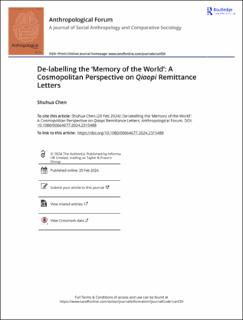De-labelling the ‘Memory of the World’: A Cosmopolitan Perspective on Qiaopi Remittance Letters
Journal article, Peer reviewed
Published version
Permanent lenke
https://hdl.handle.net/11250/3125834Utgivelsesdato
2024Metadata
Vis full innførselSamlinger
Originalversjon
10.1080/00664677.2024.2315488Sammendrag
Qiaopi, remittance family letters that maintained networks between overseas Chinese and their families and relatives in China in the nineteenth and twentieth centuries, have been recognised since 2013 by UNESCO as a ‘Memory of the World’, a piece of documentary heritage. Qiaopi have become a subject of prolific research in recent years, especially among historians. In this article, I attempt to explore what kind of resource—ethnographical, methodological, or moral—qiaopi letters as a ‘Memory of the World’ represent anthropology. To examine the world value of the qiaopi archives beyond their ‘function’ as cultural constructions of collective memory, this article places individual experience as a focus of concern upon three cosmopolitan stands to examine qiaopi family networks: (1) ethnographically, qiaopi are scrutinised as an individual practice stemming from a universal human truth for homing, insofar as they serve to articulate family networks across two disjointed worlds; (2) methodologically, qiaopi are read beyond their genre of expression with the approach of cosmopolitan interiority, in order to resonate the shared human affects that are felt in-between the lines of qiaopi letters; and (3) morally, to restore individual expressions within qiaopi family networks—including silences that are beyond expression and those lost in transition—with the aim of avoiding reinforcing discourses that seek to reduce the individuals into categorisations under cultural totalism.

